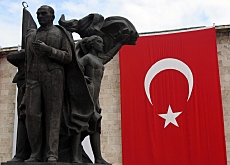Blocher’s remarks cause a storm in Switzerland

The Swiss justice minister has attacked Swiss anti-racism laws that have led to investigations against two Turks for allegedly denying the 1915 Armenian massacre.
Christoph Blocher made his comments during an official visit to Turkey on Wednesday to commemorate the 80th anniversary of Turkey’s adoption of the Swiss civil code. His words raised a storm of protest back home.
“Article 216 bis [of the Swiss penal code] gives me a real headache,” the justice minister told the media, referring to Swiss anti-racism legislation adopted in 1994 to prevent revisionist views about the Holocaust.
“No one would have imagined that this law would have resulted in proceedings against a prominent Turkish historian,” he said, following his talks with his Turkish counterpart, Cemil Cicek.
Blocher added that the justice ministry would be “examining what it could do to prevent this situation from re-occurring”, and that it was up to parliament and the government to decide on any possible changes to the law.
In 2005, Swiss authorities launched criminal investigations against the historian Yusuf Halacoglu, the president of the Turkish History Organisation, and the politician Dogu Perinçek for allegedly making comments in Switzerland denying the 1915 Armenian massacre.
Armenians say around 1.8 million of their people were killed. Turkey disputes this, putting the figure closer to 200,000. Under Swiss law any act of denying, belittling or justifying genocide is a violation of the country’s anti-racism legislation.
Scolding
Blocher’s remarks in Turkey met with sharp criticism back home.
Georg Kreis, president of the Federal Commission against Racism, criticised Blocher for once again ignoring the separation of executive and judicial powers.
“As a Swiss citizen I find it disturbing to learn from the foreign press that changes to Swiss legislation are being considered,” he noted.
Christophe Darbellay, president of the centre-right Christian Democrats, was equally vexed: “It’s strange to see a justice minister go to another country, which is not exactly a model for human rights, to criticise a Swiss parliamentary decision.”
The heads of two other two parties in government – the centre-right Radical Party and the centre-left Social Democrat party – also criticised Blocher’s statement. Blocher’s own rightwing Swiss People’s Party – the fourth party in government – declined to comment.
“We regret such irresponsible statements,” said Sarkis Shahinian, co-president of the Switzerland-Armenia association. The justice minister, he said, makes a mockery of Switzerland by “giving the worst-possible revisionists the red-carpet treatment”.
Regarding the Armenian question, which has dogged Swiss-Turkish relations over recent years, Blocher said that it was not up to politicians to comment, alluding to decisions by canton Vaud’s parliament and the House of Representatives, which have both voted to recognise the Armenian genocide.
“We are convinced that the solution of an international commission of historians [to shed light on the 1915 massacre] is a good one,” he added.
Asylum
During the official visit the Swiss justice minister also held “extremely open” discussions with Cemil Cicek on asylum and the fight against terrorism.
Anti-terrorism collaboration is said to have helped improve relations between the two countries. Bern has recently handed over to Ankara a suspected terrorist, and three other Turkish citizens also accused of terrorism are being held in Switzerland pending extradition, declared Blocher.
Earlier in the day the justice minister gave a speech at Ankara University to commemorate the 80th anniversary of the adoption of the Swiss civil code by Turkey, in which he underlined the solid, long-standing historical ties between both countries.
Later he met Turkish Interior Minister Abdulkadir Aksu, and before leaving Ankara laid flowers at the mausoleum of Mustafa Kemal Atatürk, the founder of modern Turkey.
swissinfo with agencies

More
Federal Commission against Racism
80,000 Turks live in Switzerland.
In 2004, Swiss exports to Turkey were worth SFr1.9 billion ($1.45 billion), 17% more than in 2003.
Swiss imports from Turkey in 2004 came to $410 million.
Among Swiss firms established in Turkey are Novartis, Nestlé, ABB, Ciba, Roche, Givaudan and Syngenta.
Despite having a long history, Swiss-Turkish relations have recently been strained. 2005 was an “annus horribilis”:
In March 2005 Swiss Foreign Minister Micheline Calmy-Rey visited Turkey and raised the sensitive issue of the massacre of Armenians in Turkey early last century.
In June the Swiss public prosecutor launched a criminal investigation against a Turkish historian in Switzerland who had denied the genocide, a violation of Switzerland’s anti-racism laws.
In July Turkey’s foreign minister, Abdullah Gül, described the Swiss investigation as “unacceptable” and “absolutely contrary to the principle of free speech”.
In August the Turkish authorities postponed a visit by Swiss Economics Minister Joseph Deiss citing agenda problems of his Turkish counterpart.
In November Switzerland beat Turkey in a vital World Cup playoff match, triggering ugly scenes between players.

In compliance with the JTI standards
More: SWI swissinfo.ch certified by the Journalism Trust Initiative













You can find an overview of ongoing debates with our journalists here . Please join us!
If you want to start a conversation about a topic raised in this article or want to report factual errors, email us at english@swissinfo.ch.